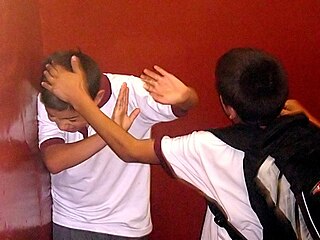Related Research Articles

Spanking is a form of corporal punishment involving the act of striking, with either the palm of the hand or an implement, the buttocks of a person to cause physical pain. The term spanking broadly encompasses the use of either the hand or implement, the use of implements can also refer to the administration of more specific types of corporal punishment such as caning, paddling and slippering.

A corporal punishment or a physical punishment is a punishment which is intended to cause physical pain to a person. When it is inflicted on minors, especially in home and school settings, its methods may include spanking or paddling. When it is inflicted on adults, it may be inflicted on prisoners and slaves.

A time-out is a form of behavioral modification that involves temporarily separating a person from an environment where an unacceptable behavior has occurred. The goal is to remove that person from an enriched, enjoyable environment, and therefore lead to extinction of the offending behavior. It is an educational and parenting technique recommended by most pediatricians and developmental psychologists as an effective form of discipline. During time-outs, a corner or a similar space is designated, where the person is to sit or stand. This form of discipline is especially popular in Western cultures.

Parenting or child rearing promotes and supports the physical, emotional, social, spiritual and cognitive development of a child from infancy to adulthood. Parenting refers to the intricacies of raising a child and not exclusively for a biological relationship.

Physical abuse is any intentional act causing injury or trauma to another person or animal by way of bodily contact. In most cases, children are the victims of physical abuse, but adults can also be victims, as in cases of domestic violence or workplace aggression. Alternative terms sometimes used include physical assault or physical violence, and may also include sexual abuse. Physical abuse may involve more than one abuser, and more than one victim.
Child discipline is the methods used to prevent future unwanted behaviour in children. The word discipline is defined as imparting knowledge and skill, in other words, to teach. In its most general sense, discipline refers to systematic instruction given to a disciple. To discipline means to instruct a person to follow a particular code of conduct.
School violence includes violence between school students as well as attacks by students on school staff and attacks by school staff on students. It encompasses physical violence, including student-on-student fighting, corporal punishment; psychological violence such as verbal abuse, and sexual violence, including rape and sexual harassment. It includes many forms of bullying and carrying weapons to school. The one or more perpetrators typically have more physical, social, and/or psychological power than the victim. It is a widely accepted serious societal problem in recent decades in many countries, especially where weapons such as guns or knives are involved.
A spoiled child or spoiled brat is a derogatory term aimed at children who exhibit behavioral problems from being overindulged by their parents or other caregivers. Children and teens who are perceived as spoiled may be described as "overindulged", "grandiose", "narcissistic" or "egocentric-regressed". When the child has a neurological condition such as autism, ADHD or intellectual disability, observers may see them as "spoiled". There is no specific scientific definition of what "spoiled" means, and professionals are often unwilling to use the label because it is considered vague and derogatory. Being spoiled is not recognized as a mental disorder in any of the medical manuals, such as the ICD-10 or the DSM-IV, or its successor, the DSM-5.
Oppositional defiant disorder (ODD) is listed in the DSM-5 under Disruptive, impulse-control, and conduct disorders and defined as "a pattern of angry/irritable mood, argumentative/defiant behavior, or vindictiveness". This behavior is usually targeted toward peers, parents, teachers, and other authority figures, including law enforcement officials. Unlike conduct disorder (CD), those with ODD do not generally show patterns of aggression towards random people, violence against animals, destruction of property, theft, or deceit. One-half of children with ODD also fulfill the diagnostic criteria for ADHD.
In sociology and psychology, poisonous pedagogy, also called black pedagogy, is any traditional child-raising methods which modern pedagogy considers repressive and harmful. It includes behaviours and communication that theorists consider to be manipulative or violent, such as extreme forms of corporal punishment.

A parenting style is a pattern of behaviors, attitudes, and approaches that a parent uses when interacting with and raising their child. The study of parenting styles is based on the idea that parents differ in their patterns of parenting and that these patterns can have a significant impact on their children's development and well-being. Parenting styles are distinct from specific parenting practices, since they represent broader patterns of practices and attitudes that create an emotional climate for the child. Parenting styles also encompass the ways in which parents respond to and make demands on their children.

Diana Blumberg Baumrind was a clinical and developmental psychologist known for her research on parenting styles and for her critique of the use of deception in psychological research.

Washing out the mouth with soap is a traditional form of physical punishment that consists of placing soap, or a similar cleaning agent, inside a person's mouth so that the person will taste it, inducing what most people consider an unpleasant experience. This form of punishment was especially common in the United States and United Kingdom from the late 19th century until the mid-20th century.
Parent–child interaction therapy (PCIT) is an intervention developed by Sheila Eyberg (1988) to treat children between ages 2 and 7 with disruptive behavior problems. PCIT is an evidence-based treatment (EBT) for young children with behavioral and emotional disorders that places emphasis on improving the quality of the parent-child relationship and changing parent-child interaction patterns.

Physical or corporal punishment by a parent or other legal guardian is any act causing deliberate physical pain or discomfort to a minor child in response to some undesired behavior. It typically takes the form of spanking or slapping the child with an open hand or striking with an implement such as a belt, slipper, cane, hairbrush or paddle, whip, hanger, and can also include shaking, pinching, forced ingestion of substances, or forcing children to stay in uncomfortable positions.
Triple P is a parenting intervention with the main goals of increasing the knowledge, skills, and confidence of parents and reducing the prevalence of mental health, emotional, and behavioral problems in children and adolescents. The program was originally specifically tailored for at risk children and parents, but there are now different levels of Triple P designed to work together as a broad, universal, public health approach. This program is based on principles of community psychology.

Corporal punishment, sometimes referred to as "physical punishment" or "physical discipline", has been defined as the use of physical force, no matter how light, to cause deliberate bodily pain or discomfort in response to undesired behavior. In schools in the United States, corporal punishment takes the form of a school teacher or administrator striking a student's buttocks with a wooden paddle.
Christopher J. Ferguson is an American psychologist who serves as a professor and co-chair of psychology at Stetson University in Florida. He previously served as an associate professor of psychology and criminal justice at Texas A&M International University. In 2014, he was named a fellow of the American Psychological Association. Ferguson is also a published author who has written both fiction and nonfiction.

Corporal punishment of minors in the United States, meaning the infliction of physical pain or discomfort by parents or other adult guardians, including in some cases school officials, for purposes of punishing unacceptable attitude, is subject to varying legal limits, depending on the state. Minor children in the United States commonly experience some form of corporal punishment, such as spanking or paddling. Despite opposition from medical and social-services professionals, as of 2024, the spanking of children is legal in all 50 states and, as of 2014, most people still believe it is acceptable provided it does not involve implements. Corporal punishment is in the United States usually considered distinct from illegal child abuse, although the distinction can often be vague.

Elizabeth Thompson Gershoff is Professor of Human Development and Family Sciences at the University of Texas at Austin. She is known for her research on the impact of corporal punishment in the home and at school on children and their mental health.
References
- 1 2 Larzelere, Robert E. (2000), "Child Outcomes of Nonabusive and Customary Physical Punishment by Parents: An Updated Literature Review" (PDF), Clinical Child & Family Psychology Review, 3 (4): 199–221, doi:10.1023/a:1026473020315, PMID 11225737, S2CID 37681413
- ↑ Wang, Ming-Te; Kenny, Sarah (2014), "Parental Physical Punishment and Adolescent Adjustment: Bidirectionality and the Moderation Effects of Child Ethnicity and Parental Warmth", Journal of Abnormal Child Psychology, 42 (5): 717–30, doi:10.1007/s10802-013-9827-8, PMID 24384596, S2CID 37712572
- ↑ Eaves, Susan H.; Sheperis, Carl J.; Blanchard, Tracy; et al. (2005), "Teaching Time-Out and Job Card Grounding Procedures to Parents: A Primer for Family Counselors", Family Journal Counseling and Therapy for Couples and Families, 13 (3): 252, doi:10.1177/1066480704273638, S2CID 144651696
- ↑ O'Grady, Colleen (November 15, 2015), Dial Down the Drama, AMACOM, ISBN 978-0-8144-3656-1
- ↑ "grounded, adj.", Oxford English Dictionary, no. 8, Oxford University Press
- 1 2 Jensen, K. Thor (August 3, 2016). "Internet Gutter: Grounded videos". Geek.com. Archived from the original on November 10, 2016.
- ↑ Alper, Meryl (2023). Kids Across the Spectrums: Growing Up Autistic in the Digital Age (PDF). MIT Press. p. 81. ISBN 978-0-262-54536-5 . Retrieved 2024-03-08.
- ↑ Dick, Jeremy (2021-01-06). "Caillou Gets Canceled on PBS After 20 Years and Parents Can't Help But Celebrate". MovieWeb. Retrieved 2024-03-08.